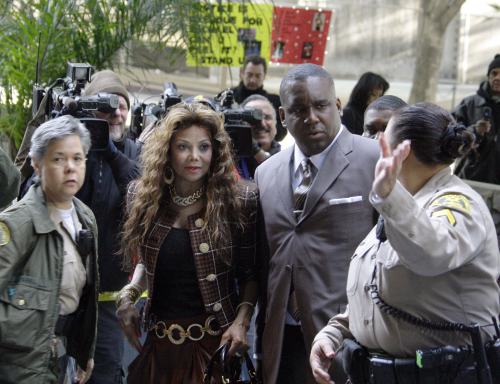LOS ANGELES (AP) ― As Michael Jackson’s lifeless body lay on a bed in his palatial mansion, a bodyguard obeyed a frantic doctor’s instructions to bag up medicine bottles and intravenous bags and shield the Jackson children from seeing their father ― all before being told to call emergency services, court testimony revealed Wednesday.
Alberto Alvarez said he was the first security guard to reach Jackson’s room after word came that something was wrong. He described a shocking scene.
The King of Pop was on his bed connected to an intravenous tube and a urinary catheter. His eyes and mouth were open, and Dr. Conrad Murray was leaning over him doing one-handed chest compressions to try to revive him.
Alvarez said he was “frozen” at the sight.
Alberto Alvarez said he was the first security guard to reach Jackson’s room after word came that something was wrong. He described a shocking scene.
The King of Pop was on his bed connected to an intravenous tube and a urinary catheter. His eyes and mouth were open, and Dr. Conrad Murray was leaning over him doing one-handed chest compressions to try to revive him.
Alvarez said he was “frozen” at the sight.

“I said, ‘Dr. Murray, what happened?’ And he said, ‘He had a reaction. He had a bad reaction,’” Alvarez recalled.
The testimony came during a preliminary hearing to determine if Murray, the singer’s personal physician, will be tried on a charge of involuntary manslaughter.
Authorities contend Murray gave Jackson a lethal dose of the powerful anesthetic propofol and other sedatives in the bedroom of his rented mansion before he died on June 25, 2009.
Deputy District Attorney David Walgren said in his opening statement that Jackson was already dead when Murray summoned help and tried to conceal his administering of propofol to the pop star, ordering the bodyguard to collect items before paramedics were called.
Murray was providing Jackson propofol roughly six times a week since being hired as his physician in May 2009, as Jackson prepared for a series of comeback concerts, Walgren said.
In other testimony, paramedic Richard Senneff, who responded to Jackson’s mansion on the day he died, said Murray never mentioned he had given propofol to the singer. Instead, the doctor said he had given Jackson lorazepam to help him sleep and indicated the pop star was being treated for dehydration, Senneff testified.
The paramedic testified that Murray’s responses didn’t add up, because the singer looked so pale and thin that Senneff thought he was a hospice patient.
He said he didn’t recognize Jackson until he was told who he was, and described the pop star as a gaunt figure clad in scrub-style pajamas and a shower cap. When he picked him up off the floor, he was cold to the touch, and his hands and feet were turning blue.
He said Murray told him Jackson had just become unconscious, but Senneff said it was obvious from his condition that an estimated 20 minutes had passed since Jackson lost consciousness.
After failing to revive Jackson with drugs, a ventilator and other measures, the paramedic said he called his base station at UCLA Medical Center and was advised to “call it” as a death.
“I told them we have a very high profile VIP and I would be more comfortable transporting him,” Senneff said. He also mentioned that Murray was present and “didn’t want to call it.”
He then took Jackson’s body to his ambulance and said he returned to the bedroom to find Murray by the bed.
“He had a white plastic trash bag and was picking up stuff,” Senneff said.
Murray rode to the hospital in the ambulance beside Jackson’s body. Further efforts to revive Jackson there failed, and he was declared dead at 2:27 p.m.
At the hospital, Senneff said, Murray was “hyperkinetic, moving around sweating, multitasking at a high rate of speed.”
“Did Dr. Murray ever advise anyone on your team that he had given Michael Jackson propofol?” Walgren asked.
“No,” Senneff testified.









![[Kim Seong-kon] Democracy and the future of South Korea](http://res.heraldm.com/phpwas/restmb_idxmake.php?idx=644&simg=/content/image/2024/04/16/20240416050802_0.jpg&u=)







![[KH Explains] Hyundai's full hybrid edge to pay off amid slow transition to pure EVs](http://res.heraldm.com/phpwas/restmb_idxmake.php?idx=652&simg=/content/image/2024/04/18/20240418050645_0.jpg&u=20240418181020)

![[Today’s K-pop] Zico drops snippet of collaboration with Jennie](http://res.heraldm.com/phpwas/restmb_idxmake.php?idx=642&simg=/content/image/2024/04/18/20240418050702_0.jpg&u=)